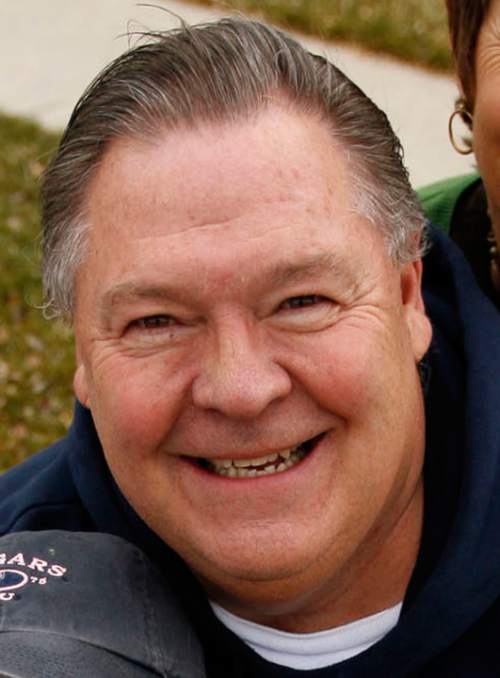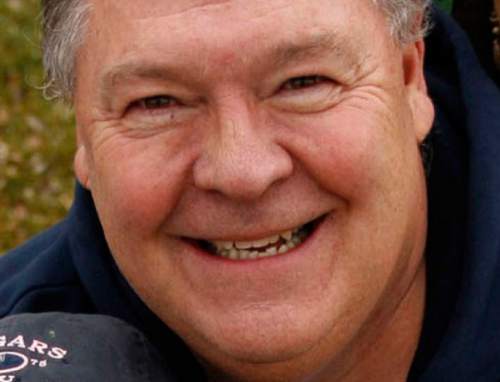This is an archived article that was published on sltrib.com in 2016, and information in the article may be outdated. It is provided only for personal research purposes and may not be reprinted.
Emails, letters and phone calls from the presiding bishop and other LDS Church officials. Enough to show that The Church of Jesus Christ of Latter-day Saints was indeed putting its considerable economic weight behind a railroad and a new industrial park on church land in southern Utah County.
Except, none of those things was real, according to witnesses at a preliminary hearing Thursday for a Utah County businessman and a former county commissioner who face criminal charges over an alleged scheme that roped in a major construction company, which paid several hundred thousand dollars to keep the phantom rail project going.
The charges also involve the sale of farm and industrial equipment at cut-rate prices, except that those implements, too, did not exist, witnesses said.
At the conclusion of a one-day preliminary hearing, 3rd District Judge Vernice Trease ordered businessman Alan Dean McKee, 57, of Benjamin, to stand trial on three counts of communication fraud and one count of pattern of illegal activity, all second-degree felonies, punishable by up to 15 years in prison.
Trease gave attorneys for former Utah County Commissioner Gary Jay Anderson, 69, of Springville, time to file a brief about their client's case, setting a hearing for June 27 to consider arguments on whether prosecutors had met their burden for Anderson to face trial on the same charges.
Mark Brennan, the regional manager for Ames Construction, testified that McKee had approached him in 2011 about building a railroad to church land in Elberta, and constructing buildings and other improvements that Brennan said might have cost as much as $900 million.
Ames paid McKee several hundred thousand dollars for expenses that were supposedly related to the project. And when the project kept getting delayed, Brennan said he received phone calls from a man who identified himself as Gary Stevenson, then the presiding bishop of the LDS Church and now a Mormon apostle, who assured him the church was backing the project.
Brennan also met in the Joseph Smith Memorial Building in downtown Salt Lake City with a man who identified himself as Eric Peling and who said he was a church official.
But Tyson Downey, a special agent in the Utah attorney general's office, told the judge that the phone number used by "Stevenson" to call Brennan was registered to McKee's home.
Downey also testified that he was never able to find someone by the name of Eric Peling, but did discover login information for Peling's email accounts on McKee's cellphone.
David Cannon, vice president of an LDS Church development company called the Suburban Land Reserve, testified he had not signed a letter to Brennan about the project, and that the letter itself did not carry the official church letterhead.
"I would never be able to bind us to this type of transaction," Cannon testified.
Brennan also said that he paid McKee about $250,000 from personal funds for farm equipment that McKee told him was being sold by an LDS farm in Elberta. Brennan never received the equipment.
His story was similar to that of businessman Chet Olsen, of Benjamin, who said he paid $750,000 to McKee for farm and industrial equipment, which he was told was coming from three bankrupt companies. When the equipment was never made available, Olsen said he started to pressure McKee.
"It was just one excuse after another," Olsen said.
Finally, Olsen said, he received phone calls from someone named David Thompson, who reported he was president of the California company arranging the sales. The caller said a bankruptcy trustee was delaying the sales, Olsen said.
In a recording of a phone call played in court, Thompson said, "We're just waiting for the bankruptcy trustee and we can't do anything about it."
But Downey said those calls also were made on a phone also registered to McKee's address and that Anderson acknowledged to him he had posed as the officer of the California company, which did not exist.
"He admitted to making a couple of calls as David Thompson," Downey said of Anderson.
One of Anderson's lawyers, Richard Van Wagoner, implied that Anderson and his family were victims of McKee, having invested more than $200,000, including about $100,000 from an Anderson retirement account.
Van Wagoner and another Anderson attorney, Nathan Crane, also pointed out that none of victims made payments to Anderson.
John Curtis, a forensic accountant, testified that McKee spent a chunk of the money he received on travel to places like Ireland, London, Hawaii and Las Vegas, and also bought ski lift tickets and paid credit card bills.
But McKee's attorney, Rebecca Skordas, got Curtis to admit that he didn't know whether the trips might have been for business purposes, such as entertaining clients.





